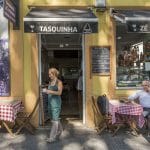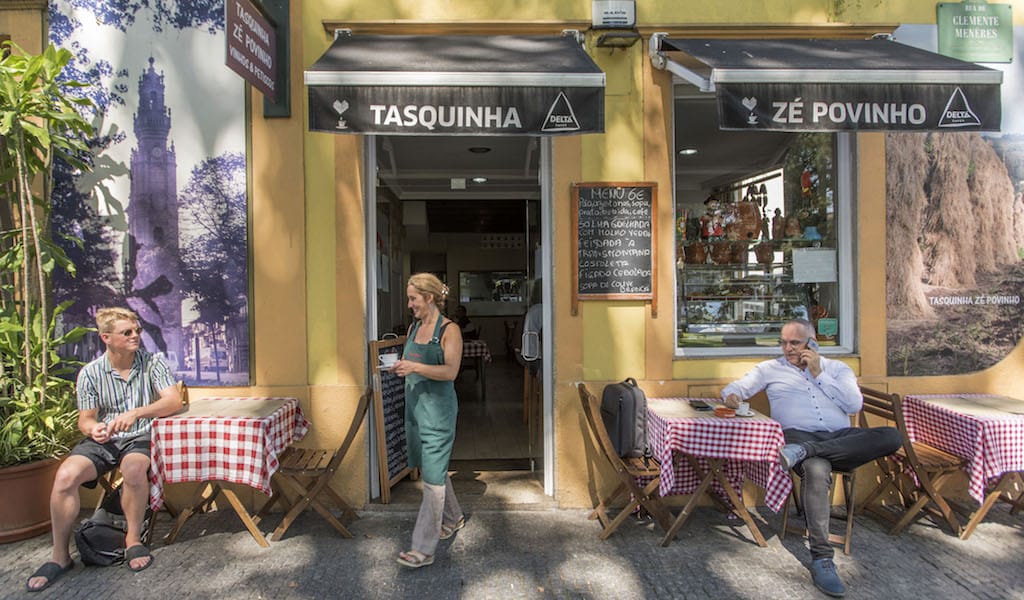After the pandemic shook Porto’s restaurant sector like an earthquake, the city’s eateries are trying to rebuild themselves. Those who are still standing have opened their doors again and are now offering more than delivery and takeaway. In this city we live for contact with other people, talking face to face; nowadays that means imagining a genuine smile behind the mask.
A well-known Portuguese expression may be one of the best descriptions for what restaurants are currently experiencing in the time of Covid: “Fazer das tripas coração” (“Making heart from the guts”). It means something like turning adversity into fuel, and in Portugal we use it to describe a superhuman effort. Because that’s what we’re all putting in currently, right?
Whenever one speaks about tripas, in Porto it always rings a bell: tripas à moda do Porto (Porto-style tripe). There’s not a single traditional restaurant in the city that doesn’t offer this dish, which is essentially a stew made of tripe (the stomach of an animal, although which one depends on the chef) and a combination of different meats: pig’s ears, cow’s trotters, chicken and different sausages. But that begs the question: where are the best guts in town? We bet the majority of tripeiros (the “tripe eaters,” as Porto locals are called) would hold your hand and take you straight to Restaurante Pombeiro. That’s certainly what we would do.

On our most recent visit, we find ample space between tables and hand sanitizer at the door – measures imposed by the pandemic. Fátima is in the kitchen while we talk to her husband, Manuel Pinto. Pombeiro has been in his family for over 30 years. While Manuel worked in another restaurant in Porto and later, after graduating with a hospitality degree, lived in Luxembourg and Switzerland, his cousins were making a name for the family’s restaurant.
In 1996, Manuel took over the space, including complete control of the kitchen. The dining room, however, worried him – the good food and low prices had attracted a set of rowdy, often hard up locals. “There was a clientele that didn’t interest us. They were customers who harassed others and I didn’t want that,” Manuel remembers. “I wanted to change the image of Pombeiro, that people were here in peace, that they came for food and not just because it was cheap. I wanted a place of good things.”
The menu was changed, and prices were increased. Many customers did not return, and Pombeiro even gained some enemies: Over the course of one year, it was robbed 25 times. “Fazer das tripas coração” is something Manuel started to get used to early on, and he thought often of his father’s words: “If it were easy to be a boss there would be no employees.” Some loyal customers stuck around, though, forming the core of their new clientele. And so Pombeiro’s true birth took place.
The birth of Porto’s love affair with tripe, however, goes much further back. According to legend, more than 600 years have gone by since the dish was supposedly first made. The story is recounted in framed posters on Pombeiro’s walls: In 1415, the people of Porto gave all the meat in the city to the armada of Infante D. Henrique – also known as Prince Henry the Navigator, he was a key figure in the Portuguese maritime discoveries – when he left to conquer Ceuta. Only the guts remained, which is how locals came to be called tripeiros, a nickname they wear with pride.

Manuel still uses his cousins’ famous recipe – no need to mess with a good thing. The ingredients may not be revolutionary – they include different cuts of veal tripe, each with its own characteristic texture, sausage and beans – but Manuel believes that the secret lies in the way they are treated. “It is respect for the product when we treat it, it is hygiene when we wash it. My wife won’t let anyone touch the tripe. It requires care, awareness,” he says.
On an average day, the restaurant serves around 50 portions of tripe (in Porto, each portion is usually enough for at least two people). And unlike other places, Pombeiro cooks up tripe every day (and has done so since 2002). “Every day we make [the dish] and every day they run out,” confirms the owner. “Several times customers arrived late at the restaurant, coming from afar to taste the guts, and I had to tell them that it was over. If you want [tripe], it is better to call ahead.”
“Many customers tell me that the most traditional, most genuine cuisine in a country is far from fashionable.”
“The best in the universe,” wrote Raúl Solnado, one of Portugal’s greatest actors, about Pombeiro’s tripe. His review can be found scribbled on a note that has been framed and hung on the restaurant’s wall, along with notes from other satisfied customers, some of whom are quite famous. But all are friends “from the moment they enter here,” says Manuel.
Although Pombeiro is outside the city center, that hasn’t dampened business. “Many customers tell me that the most traditional, most genuine cuisine in a country is far from fashionable. That it is necessary to walk,” says Manuel.

And it is worth the walk, not only for the guts but also the francesinha à Pombeiro, Manuel’s invention, which is essentially the famous sandwich wrapped in puff pastry. After gaining the approval of his eight-year-old daughter, Manuel added the francesinha to the menu. Some more puritanical customers initially wrinkled their noses at the idea, but now everyone likes this “bomb of flavors that explode in the oven.”
Manuel admits that he likes to invent in the kitchen. “It is my beach, my place of comfort. I often forget where I am, I travel,” he says. “But my wife is the one who cooks every day.” This is because, as of March this year, Manuel has taken on another job: He trains young people with disabilities to work in restaurants. “These are moments of enormous sweetness,” he says. “They are 100 percent there, they give everything they can and they are extraordinarily applied and focused.” Even though the project is not yet a year old, one of the trainees is already interning at Pombeiro.
“This is almost like ecclesiastical life,” Manuel explains, “we have to give ourselves to things because, in the end, the kitchen is easy.” Of course, good ingredients make work in the kitchen easier. Manuel sources many things from Baião, the inland village that he hails from: sausage, steak, potatoes and more. “I love it. The kitchen is my life,” he adds.

And the pandemic? After three months of offering takeaway, “more to leave home, to be in our space and not be forgotten,” the menu was reduced “so as not to waste products that were not sold.” But not all of their clients have returned: “Some will not return because they lost their jobs, or have not yet reopened their business,” says Manuel.
There are no longer tables full of large groups, but there is hope that, as long as things don’t get worse, Pombeiro will hold on. “I just want to continue to take my little boat slowly, and I want the people who come here to be happy,” concludes Manuel. Even if they have to “fazer das tripas coração.”
 October 4, 2021 Tasquinha Zé Povinho
October 4, 2021 Tasquinha Zé Povinho
When the late 19th-century Portuguese artist and cartoonist Rafael Bordalo Pinheiro […] Posted in Porto June 21, 2021 Taberna Santo António
June 21, 2021 Taberna Santo António
We arrived at Taberna Santo António after lunch, looking for a bit of warmth in the […] Posted in Porto September 30, 2020 Country Food Market
September 30, 2020 Country Food Market
Over the past five years, the Chinese government-led campaign to close down street food […] Posted in Shanghai
Cláudia BrandãoRicardo Castelo
Published on October 16, 2020
Related stories
October 4, 2021
PortoWhen the late 19th-century Portuguese artist and cartoonist Rafael Bordalo Pinheiro wanted to create a vehicle through which to mock and criticize the country’s powerful elite, he settled upon the character Zé Povinho, an unsophisticated country laborer who served as a stand-in for the average citizen. While some Portuguese people took umbrage with their country’s…
June 21, 2021
Porto | By Cláudia Brandão
PortoWe arrived at Taberna Santo António after lunch, looking for a bit of warmth in the middle of winter. It wasn’t a shot in the dark – we already knew that we would be enveloped by a comforting hospitality at this classic Porto spot. The sun was shining, so we sat on the terrace with…
September 30, 2020
ShanghaiOver the past five years, the Chinese government-led campaign to close down street food vendors and small hole-in-the-wall shops has been extremely successful. But the Covid pandemic has led China’s residents to push back. When Premier Li Keqiang praised Chengdu’s “street vendor economy” for generating 100,000 jobs after the pandemic had peaked in the foodie…





















































































